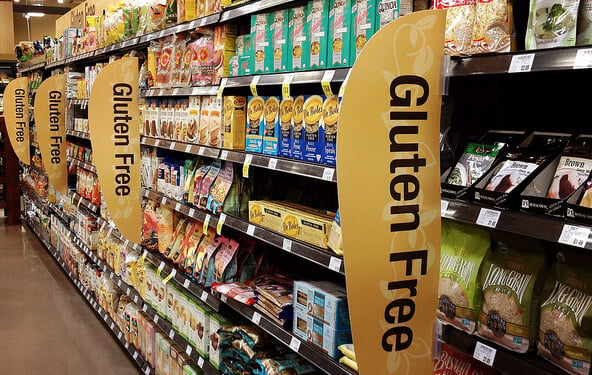Gluten-free foods are usually thought to be a healthier option, but that isn’t necessarily true. A study from researchers of the University of Hertfordshire in England found that just because the package says gluten-free doesn’t mean it’s healthy.
The study’s goal was to compare the nutrients in gluten-free foods, or what the study called ‘regular,’ foods across various categories. The researchers focus specifically on foods in the U.K. and did not study foods in the U.S.

The researchers collected nutrition and pricing information from food manufacturers as well as supermarket websites. Rosalind Fallaize, a research fellow of nutrition and dietetics at the university, said gluten-free foods usually made for a stretched budget.
“We found that gluten-free foods were significantly more expensive than regular items, which is very concerning given the movement towards stopping gluten-free prescriptions for people with Celiac disease,” she said in a press release. “It’s also clear from our research that gluten-free foods don’t offer any nutritional advantages over regular foods, so [they’re] are not a healthier alternative for people who do not require a gluten-free diet.”
After testing the various foods, gluten-free options were found to have higher fat contents and more saturated fats, sugar and salt than the regular foods. Though the results weren’t universally consistent, the researchers said most gluten-free bread and flour products contained the higher fat and sugar contents.
Gluten-free crackers were also found to have higher fat and sugar contents compared to regular foods as well. Higher salt contents were found to be more common in the regular food options.
Related: Gluten-Free Foods Might Cause Weight Gain
“On average, gluten-free products were 159 percent more expensive than regular [items],” the study said. “Gluten-free items were also more likely to be lower in fiber and protein content than regular foods.”
The gluten-free foods were selected from U.K. leading supermarkets Tesco, Sainsburys, Morrison and Asda as well as the online food retailer Ocado. 1,724 food items were analyzed in categories such as brown breads, white breads, white flour, whole grain flour, breakfast cereals, whole grain pasta, regular pasta, pizza bases, crackers and cookies.
Considering the nutritional differences of gluten-free and regular food, the researchers concluded, “Gluten-free food is unlikely to offer healthier alternatives to regular foods, except for those who require a gluten-free diet for medically diagnosed conditions, and it is associated with higher costs.”
Tori Linville is a freelance writer and editor from Clarksville, Tennessee. When she isn’t writing or teaching, she’s faithfully watching her alma mater, the University of Alabama, dominate the football field.


![How To: ‘Fix’ Crepey Skin [Watch]](https://cdn.vitalupdates.com/wp-content/uploads/2017/05/bhmdad.png)












